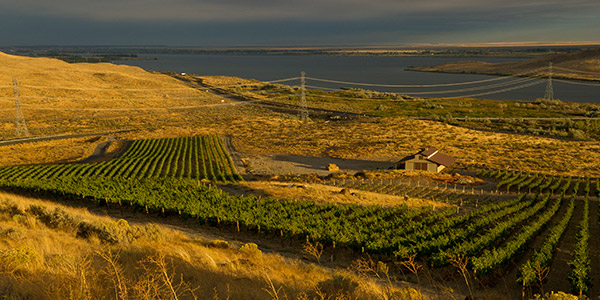The Horse Heaven Hills are a bare brown line of ridges and hills, just south of the Tri-Cities, a small metro area of about 200,000 strung along the Columbia River in Washington state. They run roughly east-west for maybe 15 miles. It is largely wheat farms and some vineyards. No apparent sites are sacred to area tribes. Ferruginous hawks — listed as threatened under the federal Endangered Species Act — cruise around the area.
Wind is a major feature here. Several miles to the northwest on the 3,500-foot-tall unpopulated Rattlesnake Ridge, an anemometer once hit 150 mph. On a recent day, 60-mph winds swept the Tri-Cities, and the anemometer almost hit 100 mph.
In 1992, a wind turbine project was proposed at Rattlesnake Ridge. The locals despised it. The project died the same year.
Fast forward to 2021. Scout Clean Energy of Boulder, Colo., has proposed building up to 224 wind turbines — about 500 feet tall — on 112 square miles of mostly private land in the Horse Heaven Hills. About 294 acres of that land would also hold solar panels. The wind turbines and solar panels are projected to produce 1,150 MW. That’s roughly the same output as the Columbia Generating Station, a commercial nuclear reactor just north of the Tri-Cities.
“We become used to cussing the wind,” Benton County resident Tom Blakeny said at a Tuesday hearing on the proposal. “It’ll be a big change to encourage it to blow.”
If built, the wind project would be the second in Benton County. Richland-based Energy Northwest, which owns and operates Columbia Generating Station, built and operates 63 wind turbines several miles to the southeast of the northern face of the Horse Heaven Hills. Completed in 2007, that site covers about 8 square miles and produces almost 96 MW.
Energy Northwest’s turbines are not controversial, but they cannot be seen from the Tri-Cities. Scout’s turbines would be, a major factor in Benton County residents opposing the project.
Benton County’s government received about 400 phone calls and emails about the project, with about 90% opposing the project, Benton County Commissioner Will McKay said Tuesday. Scout commissioned its own poll of 500 people in December 2020, showing 34% opposing it.
Opposition was also significant, but hard to quantify, at a Tuesday public hearing held by the Washington State Energy Facility Site Evaluation Council (EFSEC) on the project conducted via Skype. Numerous technical problems plagued the hearing, making it difficult to pin down numbers and names. However, the majority of the roughly 40 speakers opposed Scout’s project.
“Scout recognizes this is the first step in a very long process,” said project manager Dave Kobus.
‘Industrial Horizon’
What emerged from Tuesday’s hearing is how differently people view the Horse Heaven Hills. Many Tri-Citians see a stark clean beauty to the hills and ridges. “It’ll rob our region of its scenic beauty,” said Michael Novakovich, president of the Visit TRI-CITIES organization.
A few see a place where landowners are being denied their property rights of being able to lease their land to Scout. Others see wind turbines usurping farmland. The site covers 1.1% of Benton County’s agricultural lands. Others see rare and valuable shrub steppe being threatened.
Labor unions see lots of jobs.
Scout sees a predicted power shortage of 8,000 MW in Washington, Oregon, Idaho and Montana by 2030, with its project contributing to a solution to that shortfall. The company has five wind-and-solar sites in Texas, Oklahoma, Indiana and California.
On Tuesday, two Benton County government planners, Greg Wendt and Michelle Cook, testified that the Scout project does not comply with county plans earmarking the area for agricultural use in its long-range land-use planning. Installing wind turbines could change the underground hydrology of the area. And only 44 of the 244 potential turbine spots have been adequately studied for ecological ripple effects, they said.
Meanwhile, Michael Ritter, representing the Washington Department of Fish and Wildlife, said his agency determined that “it will be difficult to almost impossible to mitigate” environmental damages from installing the turbines. He also said it is concerned about the loss of shrub steppe habitat.
A few said that some vineyards and wineries are scattered around the Horse Heaven Hills, with wineries being a major tourism draw for Benton County. State Rep. Mary Dye (R), who represents a district adjacent to Benton County, argued that turbines will affect micro-climates around the vineyards. Wine grapes are finicky and sensitive to unusual temperatures.
Resident John Christian said the turbine threatened the area’s ferruginous hawks. “You cannot construct a kill zone of wind turbines in this area,” he said.
Another resident, Marcus Stauffer, said, “Tourism is big business in our area. … People don’t come to watch a giant industrial horizon.”
Meanwhile, leaders of two construction and electrical worker labor unions — their identities garbled in the glitch-filled Skype hearing — said the turbines would be a big economic boost to the Tri-Cities, including being a tax windfall for local schools and roads. Scout predicted the project would lead to 930 construction jobs and 56 permanent jobs.



